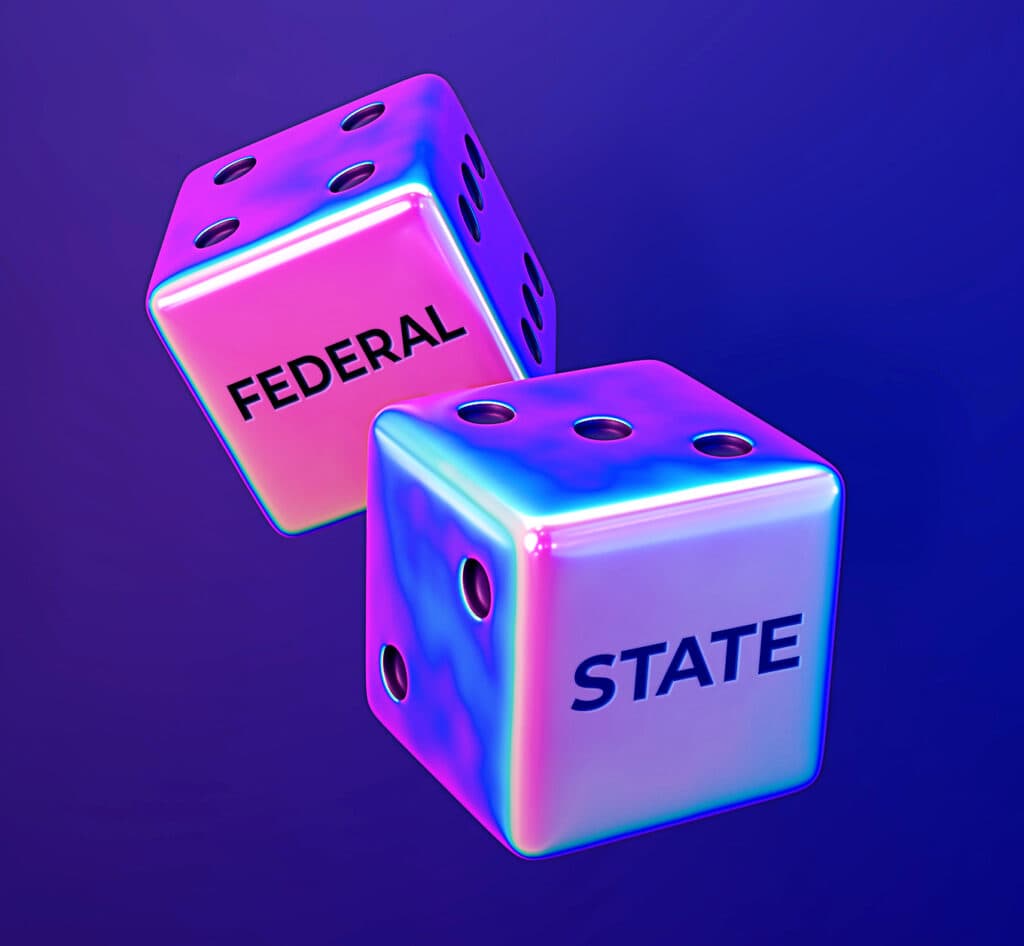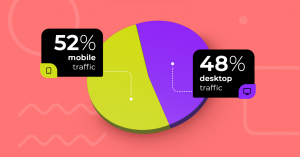iGaming and the United States of America have a rough past but promising future. The complicated legal landscape in the country that consists of semi-autonomous states makes the adoption of iGaming-friendly regulations slow but consistent.
After all, it’s just another business and if you know one thing about America, it’s that Uncle Sam loves business.
The overal trend is that igaming in its various forms is slowly being legalized, state by state, bill after bill. The victory march of igaming, albeit slow, seems unavoidable. fsd
Now, it’s time to get really wet. It’s time for a deep-dive into the muddy waters of iGaming in the United States.
A Very Brief Introduction to iGaming
iGaming, or online gaming, is not a clearly defined term. That causes problems in many jurisdictions, as it is hard to ban or allow something that is not widely understood. Even people from the industry use narrower or wider definitions for this term.
For the purpose of this article, we define iGaming as an online gambling activity that is based on games of chance. We exclude sports betting and fantasy sports – although legal regulations for legal sports betting and iGaming often accompany each other, it is not always the case.
So, iGaming activities are:
- Online poker
- Online casinos and roulettes
- Online lotteries
Now that we’ve agreed on what we are going to talk about, let’s look at the legal status of iGaming in the US.
iGaming in the United States – Overview
The laws that are applicable to iGaming are created on two levels:
- Federal
- State

Let’s start with the federal level.
Because of the lack of clear definition of iGaming, it was universally accepted that the law that regulates this area is 1961’s Wire Act. But in response to New York and Illinois’ inquiries in 2011, the DOJ issued an opinion that this act applies to interstate sports betting only. This did not legalize iGaming in the US per se, but rather made it not illegal. There was a legal back and forth in the decade that followed, but the status quo remained unchanged. It was up to the states to decide on the status of iGaming.
The slow adoption of iGaming
Traditional brick-and-mortar gambling was restricted to a few selected jurisdictions and Indian reservations. In all seven states that have allowed iGaming since the initial DOJ opinion, the licences for online gaming activity were mostly granted to those that already had a gambling license.
There are some differences – some states do allow third-party entities to apply for an igaming license or some casinos can use different brands and run several seemingly independent online gambling ventures but mostly it is handled by already established enterprises.
To sum up, there are usually three types of entities that run legal igaming businesses in the seven states that allow it:
- State lotteries
- Tribal or state-owned casinos or racinos (casinos with a racing track)
- Third-parties that got their license from a governing body
Online gambling from an outside jurisdiction
The Internet by its nature is not tied to a single geographical location. What works well with traditional gambling establishments (licensing physical places) does not translate well into the digital world.
Europe and many parts of the world had a much more favorable approach to iGaming, which led to the creation of big iGaming hubs (such as Gibraltar or Malta) that dominated online gambling. These sites, run from these hubs, can still be accessed from the US.
The legal approach dictates that gambling using unlicensed sites is a crime. What is more, accessing a site that is legal in one state from another state is not legal, even if you are a resident of that state on a trip.
Of course, this is theory – in practice, there are solutions such as VPNs that allow people to safely access these websites whenever they want. But advertising these websites may result in a ban, so make sure that what you advertise is in line with a given state’s legislation and your ad network’s compliance policy. State regulators often mandate casino owners to use GPS and IP tracking to ensure that only authorized residents may access iGaming websites.
US residents that gamble using offshore sites (or sites that are legal in different states) are not protected from any fraud and financial problems that they may get into. Legal sites offer more security for their users.
States that Legalized iGaming

Below you will find the list of states that made iGaming legal, with a description detailing how everything works.
Note that the list of states where traditional brick-and-mortar gambling is allowed is longer than the list of states with legal online gambling.
The list is in alphabetical order.
Connecticut
Connecticut legalized iGaming on 19 October 2021. Online gambling is legal for people over 21. There are currently three establishments that offer gambling services:
- Mohegan casino (owned by the Mohegan tribe). This is the second biggest casino in the US (the biggest one is in Oklahoma)
- Foxwood casino (owned by Pequot tribe)
- Connecticut Lottery.
They all can offer online gambling services with a partner: Foxwoods with DraftKings, Mohegan with FanDuel, and the lottery with Rush Street, whose sports book is branded as PlaySugarHouse.
Delaware
Delaware legalized online poker, lottery games and casino games in 2012. Delaware operates three racinos:
- Delaware Park Online (Delaware Park)
- Dover Downs Online Gaming (Dover Downs)
- Harrington Online (Harrington Raceway)
All three locations operate with 888 Holding to provide online gambling services to Delaware residents.
Michigan
The legislation that made legal online gambling in Michigan possible was introduced in December 2019. There are 26 traditional casinos and 9 online ones that are run by industry’s veterans such as FunDuel or DraftKings.
Michigan is breathing down New Jersey’s neck in terms of revenue generated by online gambling and it is expected to be on par with it within a year.
New Jersey
New Jersey, the country’s top revenue generator for online and offline gambling activity, operates with 9 land-based casinos. They operate using their own brands and additionally can “reskin” themselves to operate under a different brand in cooperation with outside gambling brands. This vastly increases the number of iGaming sites that can legally operate in the Garden State.
For example, Borgata Hotel Casino & Spa uses 10 different websites to run its iGaming business, such as:
- www.borgatapoker.com
- www.nj.partycasino.com
- www.nj.partypoker.com
Some entities use names that even suggest country-wide reach. Caesars Interactive Entertainment runs a site ‘us.888poker.com’, which doesn’t have a state or casino name in it.
Pennsylvania
Pennsylvania allowed iGaming in 2017, yet the first online casino was not launched until July 2019. The Keystone state issues 39 iGaming licenses in total: 13 certificates for peer-to-peer poker games, 13 certificates for non-peer-to-peer simulated slot machines, and 13 certificates for non-peer-to-peer simulated banked table games
Currently, there are 16 online casinos operating in the Commonwealth.
Rhode Island
In 2023, Rhode Island became the seventh state to approve iGaming, making it the first state to do so that year.
West Virginia
West Virginia offers several legally-licensed online casinos available to players 21 and up since March 2019. There are currently 5 land-based casinos in the Mountain state but this number is likely to increase in the future. These casinos are:
- BetMGM,
- Caesars,
- BetRivers,
- FanDuel,
- DraftKings.
One of the Casinos is owned by the current WV governor Jim Justice, so you can bet that the legislation is pretty favorable.
Overview of current legal status and prospects of iGaming in the remaining states

IGaming is the most restricted form of online games of chance. More states have allowed sports betting – 30 to be exact – with 18 of them allowing online sports betting.
Most states in the union allow gambling, just not via the Internet. Out of all 50 states, there are only 8 states that don’t have any casinos and 2 that ban all sorts of gambling (Hawaii and Utah, with Utah unlikely to ever legalize it due to Mormonism).
States are more willing to legalize online games with real money involved, if the games are considered a game of skill rather than game of chance. The prime example is daily fantasy sports (DFS). DFS operators run their businesses in 41 states, although only 19 of them have formalized it.
Another example of exemptions from the ban on iGaming are charitable events, bingo-halls or some forms of parimutuel betting (wagering).
Almost all states do however offer a ‘virgin’ version of online gambling in the form of social casinos, where you can practice, play, and enjoy the social aspect of igaming with no real money involved, and sweepstake casinos, where you play with virtual currency that does not hold any value.
Advertising these options may be a good way to collect data for the future and get people accustomed to this form of entertainment.
Some states are considering losing their ban on iGaming due to the financial incentive – they could tax money used in gambling. Apart from the most conservative states, it is likely that some forms of online gambling will be allowed in the future in most of the US states and territories.
Alabama
Only social casinos are allowed – so places where you can play with no money being exchanged.
Alaska
Online betting is illegal and this status is not expected to change soon.
Arizona
Online sports betting and fantasy sports are allowed, online casinos are not.
Arkansas
Online gambling is illegal in Arkansas. Gambling is only allowed within the premises of the two existing casinos.
California
Online gambling is not legal in California. Sports betting is expected to be legalized this year. There are gambling options in land-based tribal casinos.
Colorado
You cannot legally gamble in Colorado, neither online nor offline. There are only some social casinos, a state lottery plus a horse racing track available.
Florida
The state’s laws do not mention online gambling, so it is assumed that you can legally gamble via offshore websites. There are prospects of legislation that will legalize iGaming in Florida soon.
Georgia
The state of Georgia forbids playing for money, both online and offline. There is a small casino available on a cruise ship. Many sites in Georgia use a social casino model or allow people to play using virtual currencies.
Hawaii
Gambling in any form is not legal in Hawaii.
Idaho
All forms of iGaming are not legal in Idaho.
Illinois
There are a couple of land-based casinos in Illinois, however, the only online option are sweepstakes casinos.
Indiana
There are 14 brick-and-mortar casinos in Indiana plus a racetrack, where residents can gamble. However, iGaming is not legal in Indiana, the only option are sweepstake casinos. Online sports betting is legal though.
Iowa
Online gambling with real money is not legal, only social or sweepstakes casinos are available. Sports betting is legal.
Kansas
Online gambling is not regulated but illegal, because gambling in general is only allowed in 6 tribal casinos and 4 state-owned casinos.
Kentucky
There is no option to place a bet in a casino in Kentucky. There are no land-based casinos in Kentucky and online casinos with real money are prohibited.
Louisiana
24 land-based casinos are present in Louisiana but none of them offer legal online gambling. Online sports betting is legal though.
Maine
There are two traditional casinos but no online gambling options in Maine. Only sweepstake casinos are allowed.
Maryland
Only social casinos are legal in Maryland.
Massachusetts
Games of skill, such as fantasy sports, are allowed in Massachusetts. iGaming is not legal.There are three traditional land-based casinos in Massachusetts.
Minnesota
Although Minnesota is a home to 18 tribal casinos, there is no option to place a bet online in that state.
Mississippi
There are 36 land-based casinos in Mississippi and they are the only option for gambling for their residents.
Missouri
Online gambling is not legal. There are 14 traditional casinos operating in Missouri.
Montana
Although there are many small electronic gambling sites in Montana plus seven tribal casinos, iGaming is banned.
Nebraska
The only online gambling options in Nebraska are social or sweepstake casinos with no real money involved.
Nevada
Online gambling laws in Nevada permit online poker and online sports betting but don’t license any online casino sites. Online sports betting requires initial in-person presence in the venue that runs it.
There are 441 land-based casinos in Nevada.
New Hampshire
New Hampshire is one of the few states that has a complete ban on commercial casinos, both online and offline. There are only some licensed bingo halls and online social casinos available.
New Mexico
Sports betting and online gambling is not legal in New Mexico. The only legal betting occurs in ten tribal casinos.
New York
The state of New york is expected to legalize online casinos till the end of 2022 but for now, gambling is possible in 12 casinos and racinos. Sports betting was made legal at the beginning of 2022.
North Carolina
Apart from the three land-based casinos in the states, there are no other legal gambling options in North Carolina, including online gambling.
North Dakota
North Dakota is home to 27 casinos. Residents can play online poker but not for real money, only for practice. Igaming is not legal in North Dakota.
Ohio
Ohio is the home of 11 casinos and racinos and, for the time being, they are the only option for residents to gamble with real money apart from sports betting. Starting from January 1, 2023, sports betting became legal in Ohio. Licensed operators now offer online sportsbooks and operate brick-and-mortar establishments under the regulation of the Ohio Casino Control Commission.
Oklahoma
Oklahoma has 110 casinos but iGaming is illegal and the chances of it being legal are vague at best.
Oregon
Sport betting is legal, iGaming is not, apart from on the premises of Oregon’s 8 casinos.
South Carolina
South Carolina has one of the strictest regulations related to gaming in general. There are no traditional casinos and online gambling is forbidden.
South Dakota
Igaming is not legal in South Dakota. Online sports betting is possible via Deadwood casinos.
Tennessee
No casinos are present in Tennessee and there are no legal online gambling options in this state. Only online social casinos are allowed.
Texas
Texas is not favorable towards gambling in general. The state’s only casino, Kickapoo Lucky Eagle Casino, operates under federal rather than state jurisdiction. No iGaming is allowed in the Lone Star state.
Utah
Utah has the strictest approach towards gambling in general in the country and bans all gambling activities.
Vermont
Vermont does not regulate online gambling and by implication – does not license it. So there are no state-licensed casinos that can operate online (no land-based casinos either).
Virginia
Apart from Virginia’s five land-based casinos, there are no legal betting options in this state.
Washington
The state of Washington licenses 29 tribal casinos but not a single online casino. iGaming is not legal in the state of Washington.
Wisconsin
The only legal online gambling option in Wisconsin are social casinos.
Wyoming
Wyoming is home to 3 tribal casinos. It also offers legal sports betting but not online gambling.
The ever-changing landscape of igaming legislation
Online gambling is a hot topic right now and the landscape will probably be very different in one-two years. Apart from the most conservative states, many others are at least considering allowing online sports betting or online casinos. A new stream of tax dollars is a huge incentive.
Everyone’s eyes are focused on the pioneering states and how things will play out for them. The usual reservations towards legalizing those – crime rates, public health issues – will be closely monitored too.
For now, advertisers have several ways to operate:
- Advertising legal online casinos or sports betting site in states that have legalized it
- Advertising social or sweepstake casinos in remaining states and waiting for more favorable legislation
The most likely scenario that unfolds before our eyes is the slow adoption of iGaming through partnerships of land-based casinos with state licenses for online gambling with big global players. The most likely result are online gambling services operating under the brand of the casino, brand of the global operator or completely new brand – a ‘resking’ of the original site.
With the tectonic changes coming slowly to the US market, we recommend following news closely and, if your advertising budget allows it, slowly running campaigns for legal social casinos to gather necessary data and expertise.
Collecting data with Voluum
The best way to collect and analyze data is to use an ad tracker such as Voluum. It records each click on a paid ad and/or each visit to the landing page, if you are using SEO techniques. All these events are recorded with accompanying data, such as browser language, device type or IP-based location.
Once you analyze gathered data, you can then optimize your campaign to run things more efficiently:
- Create rule-based paths that send visitors to different landing pages (for example, you can send US residents that have set their browser language to Spanish to the Spanish version of a landing page).
- Create auto-rules that will alert you or pause your campaigns in case your profitability drops or run your campaigns during specific hours of the day or days of the week.
- Filter out bot traffic to maintain clean and unskewed data











